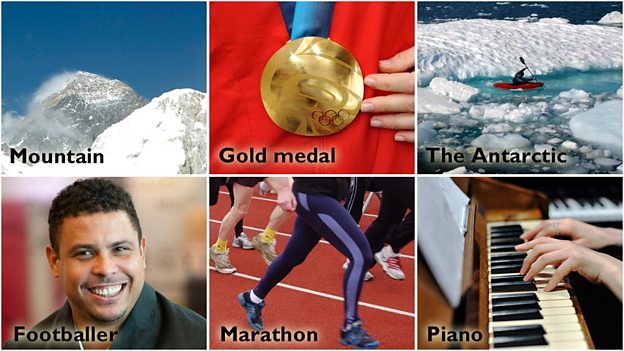Unit 11: The bucket list
The present perfect with ‘ever’ and ‘never’
Select a unit
- 1 Nice to meet you!
- 2 What to wear
- 3 Like this, like that
- 4 The daily grind
- 5 Christmas every day
- 6 Great achievers
- 7 The Titanic
- 8 Travel
- 9 The big wedding
- 10 Sunny's job hunt
- 11 The bucket list
- 12 Moving and migration
- 13 Welcome to BBC Broadcasting House
- 14 New Year, New Project
- 15 From Handel to Hendrix
- 16 What's the weather like?
- 17 The Digital Revolution
- 18 A detective story
- 19 A place to live
- 20 The Cult of Celebrity
- 21 Welcome to your new job
- 22 Beyond the planets
- 23 Great expectations!
- 24 Eco-tourism
- 25 Moving house
- 26 It must be love
- 27 Job hunting success... and failure
- 28 Speeding into the future
- 29 Lost arts
- 30 Tales of survival
Session 1
If you want to tell someone about things you have - or haven't - done, you'll need the present perfect tense. This is one of the most useful verb forms in English for talking about life experiences. And it's easy to get wrong, so we're here to help. Let's start by looking at some words we'll need to use it.
Activity 1
A bucket list
Things to do before you're 30
It's fun to set yourself a list of things to achieve - but how many of them will you really do? It's becoming popular to create a ‘bucket list’ - things to do before you die or before a certain age. Take a look at the picture and think about the experiences you've had in your life so far.
Complete the activity

To do
There are six life experiences suggested by the photo. In the next activity, you'll learn which verbs we use to talk about those experiences and activities. That will help you create your own 'bucket list' later on!
Which verb?
6 Questions
Choose the correct verb to go with each activity/experience shown in the picture
Help
Activity
Choose the correct verb to go with each activity/experience shown in the picture
Hint
You climb high thingsQuestion 1 of 6
Help
Activity
Choose the correct verb to go with each activity/experience shown in the picture
Hint
What do Olympic athletes have to do to get a gold medal?Question 2 of 6
Help
Activity
Choose the correct verb to go with each activity/experience shown in the picture
Hint
Lots of people do this at schoolQuestion 3 of 6
Help
Activity
Choose the correct verb to go with each activity/experience shown in the picture
Hint
Can you climb a continent?Question 4 of 6
Help
Activity
Choose the correct verb to go with each activity/experience shown in the picture
Hint
The wrong answer goes with ‘a ball’.Question 5 of 6
Help
Activity
Choose the correct verb to go with each activity/experience shown in the picture
Hint
The wrong answer goes with ‘a race’Question 6 of 6
Excellent! Great job! Bad luck! You scored:
Next
How did you get on? It's very useful to learn verbs and nouns which go together. These are called 'collocations'.
So, have you climbed a mountain or met a footballer? In the next activity, we'll hear from some people talking about the life experiences shown in the photo. Then we'll look at the words they use to form the present perfect tense.
Session Vocabulary
the Antarctic
the very cold region that is the most southern part of the worldbucket list
a list of the things you want to do before you reach a certain age, or before you dieclimb
to go up somethingmarathon
a race where people run over a distance of 42 kilometresmedal
a small flat piece of metal that you can win in a competition, or for doing something very brave